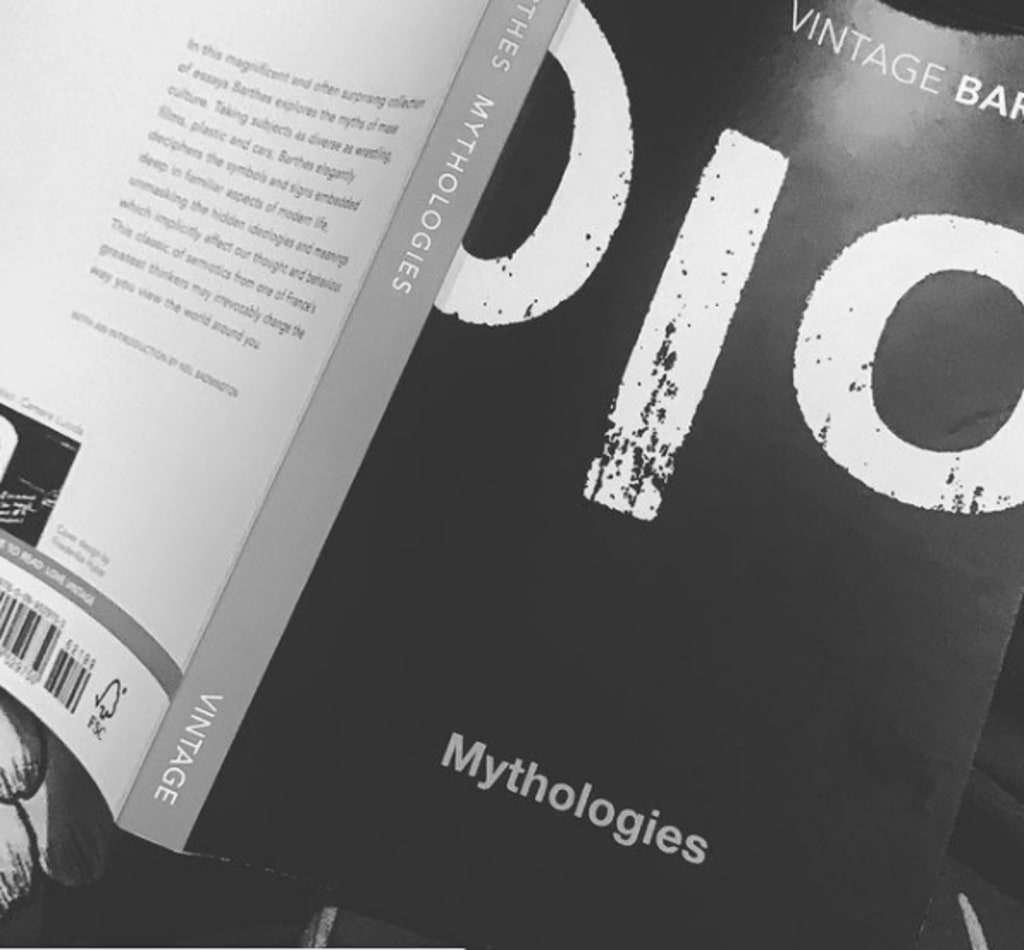Book Review: "Mythologies" by Roland Barthes
5/5 - A brilliantly set-out analysis of the modern lifestyle...

Roland Barthes has always been a favourite critic of mine to read because his philosophies are so out there and yet, they are perfectly explained through everyday things. These things include everything from Ancient Romans to Margarine to Children’s Novels and more - Roland Barthes analysis them all in some weird and strange perspective. In this particular book of “Mythologies” - Roland Barthes takes seemingly normal situations and hyper-analysis why they remain a part of people’s lives. This book is a brilliant part of the Roland Barthes is something incredible of the philosophies and though I do not agree with all of the stuff he says, but there are always things that are so well written that I cannot resist but read them.
Let us have a look at some of my favourite quotations from the text and if you want more Roland Barthes stuff then I suggest you read “Camera Lucida” that is also a pretty good book:
“Each sign in wrestling is therefore endowed with an absolute clarity since one must always understand everything on the spot. As soon as the adversaries are in the ring, the public is overwhelmed with the obviousness of the roles. As in the theatre, each physical type expresses to excess the part which has been assigned to the contestant. Thauvin, a fifty-year-old with an obese and sagging body, whose type of asexual hideousness always inspires feminine nicknames displays in his flesh the characters of baseness, for his part to represent what, in the classic concept of the salaud the bastard, as appears as organically repugnant.”
I think that this quotation really teaches us how Roland Barthes creates lines between what he is talking about at the time and other things such as theatre and the everyday. Let’s take a look at another one, from the same chapter:
“Each moment in wrestling is therefore like an algebra which instantaneously unveils the relationship between a cause and its represented effect. Wrestling fans certainly experience a kind of intellectual pleasure in seeing the moral mechanism function so perfectly. Some wrestlers, who are great comedians, entertain as much as a Moliere character, because they success in imposing an immediate reading of their inner nature: Armans Mazaud, a wrestler of an arrogant and ridiculous character always delights the audience by the mathematical rigour of his transcriptions, carrying the form of his gestures to the furthest reaches of their meaning and giving to his manner of fighting the king of vehemence and precision found in a scholastic disputation in which what is at stake is at once the triumph of pride and the formal concern with truth.”
Now, it is more than true that the books of Roland Barthes can be a bit wordy from time to time and can also be overly expressive to the amount that is almost too hard to read.
“When the hero or the villain of the drama, the man who was seen a few minutes earlier possessed by moral rage, magnified into a sort of metaphysical sign, leaves the wrestling hall, impassive, anonymous, carrying a small suitcase and arm-in-arm with his wife, no one can doubt that wrestling holds that power of transmutation which is common to the spectacle and the religious worship.”
When it comes down to the arguments, there is a lot of way for looking through them into the aspects of humanity. What I mean is that there is almost a way of looking at them which makes them completely true however, we must not assume that this guy knows how everyone experiences everything in the same way. Let’s take a look at another one:
“The populace, upset by the death of Caesar, then by the arguments of Mark Antony, is sweating and combining economically in this single sign, the intensity of its emotion and the simplicity of its condition. And the virtuous men, Brutus, Cassius, Casca, are ceaselessly perspiring too, testifying thereby to the enormous physiological labour produced in them by a virtue just about to give birth to a crime. To sweat is to think - which evidently rests on the postulate, appropriate to a nation of businessmen that thought is a violent, cataclysmic operation, of which sweat is only the most benign symptom. In the whole film there is but one man who does not sweat and who remains smooth-faced, unperturbed and watertight: Caesar.”
All in all, there are a bunch of quotations in this book that are relative to life, but there is only the assumption supported by his own thoughts and we must not assume that these are unanimous opinions.
About the Creator
Annie Kapur
200K+ Reads on Vocal.
English Lecturer
🎓Literature & Writing (B.A)
🎓Film & Writing (M.A)
🎓Secondary English Education (PgDipEd) (QTS)
📍Birmingham, UK






Comments
There are no comments for this story
Be the first to respond and start the conversation.